Leadership Competencies and Skills for Aged Care Staff: A Review
VerifiedAdded on 2019/12/03
|19
|8015
|168
Literature Review
AI Summary
This literature review examines the critical leadership competencies and skills required for aged care staff, focusing on the Australian context. It explores key attributes such as person-centered focus, inspiring and motivating others, interpersonal skills, resilience, and people development. The review synthesizes findings from various studies to highlight the importance of these competencies in effectively managing aged care homes and delivering quality services. It delves into the need for leadership development programs, the impact of training on staff performance, and the competencies needed for effective communication, relationship building, and team management. The objectives include understanding key leadership attributes, developing a theoretical knowledge base, and designing effective training programs. The review also acknowledges limitations and suggests areas for further research, emphasizing the evolving landscape of aged care and the need for continuous improvement in leadership skills to meet the growing demands of the sector.

LITERATURE REVIEW
Paraphrase This Document
Need a fresh take? Get an instant paraphrase of this document with our AI Paraphraser
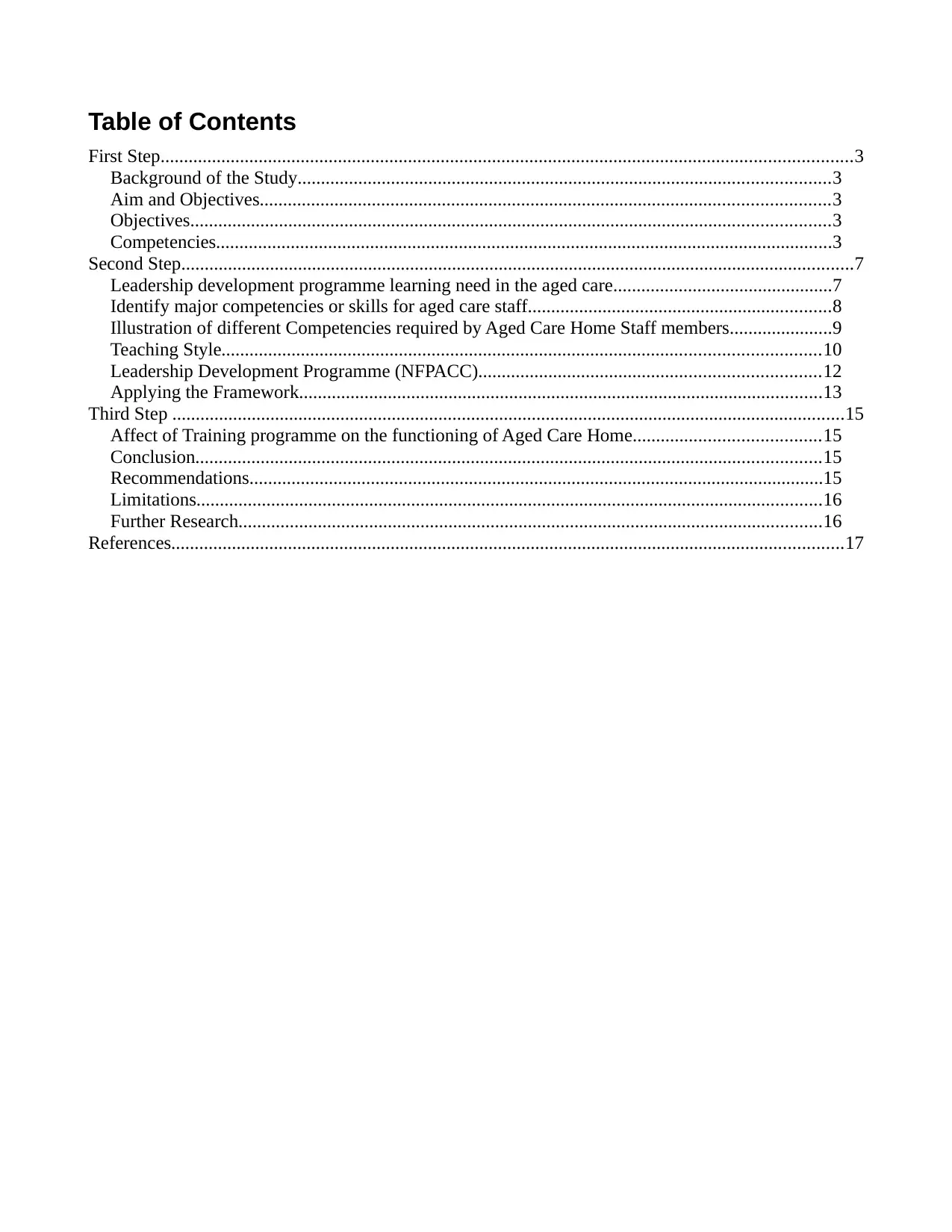
Table of Contents
First Step....................................................................................................................................................3
Background of the Study..................................................................................................................3
Aim and Objectives..........................................................................................................................3
Objectives.........................................................................................................................................3
Competencies....................................................................................................................................3
Second Step................................................................................................................................................7
Leadership development programme learning need in the aged care...............................................7
Identify major competencies or skills for aged care staff.................................................................8
Illustration of different Competencies required by Aged Care Home Staff members......................9
Teaching Style................................................................................................................................10
Leadership Development Programme (NFPACC).........................................................................12
Applying the Framework................................................................................................................13
Third Step ................................................................................................................................................15
Affect of Training programme on the functioning of Aged Care Home........................................15
Conclusion......................................................................................................................................15
Recommendations...........................................................................................................................15
Limitations......................................................................................................................................16
Further Research.............................................................................................................................16
References................................................................................................................................................17
First Step....................................................................................................................................................3
Background of the Study..................................................................................................................3
Aim and Objectives..........................................................................................................................3
Objectives.........................................................................................................................................3
Competencies....................................................................................................................................3
Second Step................................................................................................................................................7
Leadership development programme learning need in the aged care...............................................7
Identify major competencies or skills for aged care staff.................................................................8
Illustration of different Competencies required by Aged Care Home Staff members......................9
Teaching Style................................................................................................................................10
Leadership Development Programme (NFPACC).........................................................................12
Applying the Framework................................................................................................................13
Third Step ................................................................................................................................................15
Affect of Training programme on the functioning of Aged Care Home........................................15
Conclusion......................................................................................................................................15
Recommendations...........................................................................................................................15
Limitations......................................................................................................................................16
Further Research.............................................................................................................................16
References................................................................................................................................................17
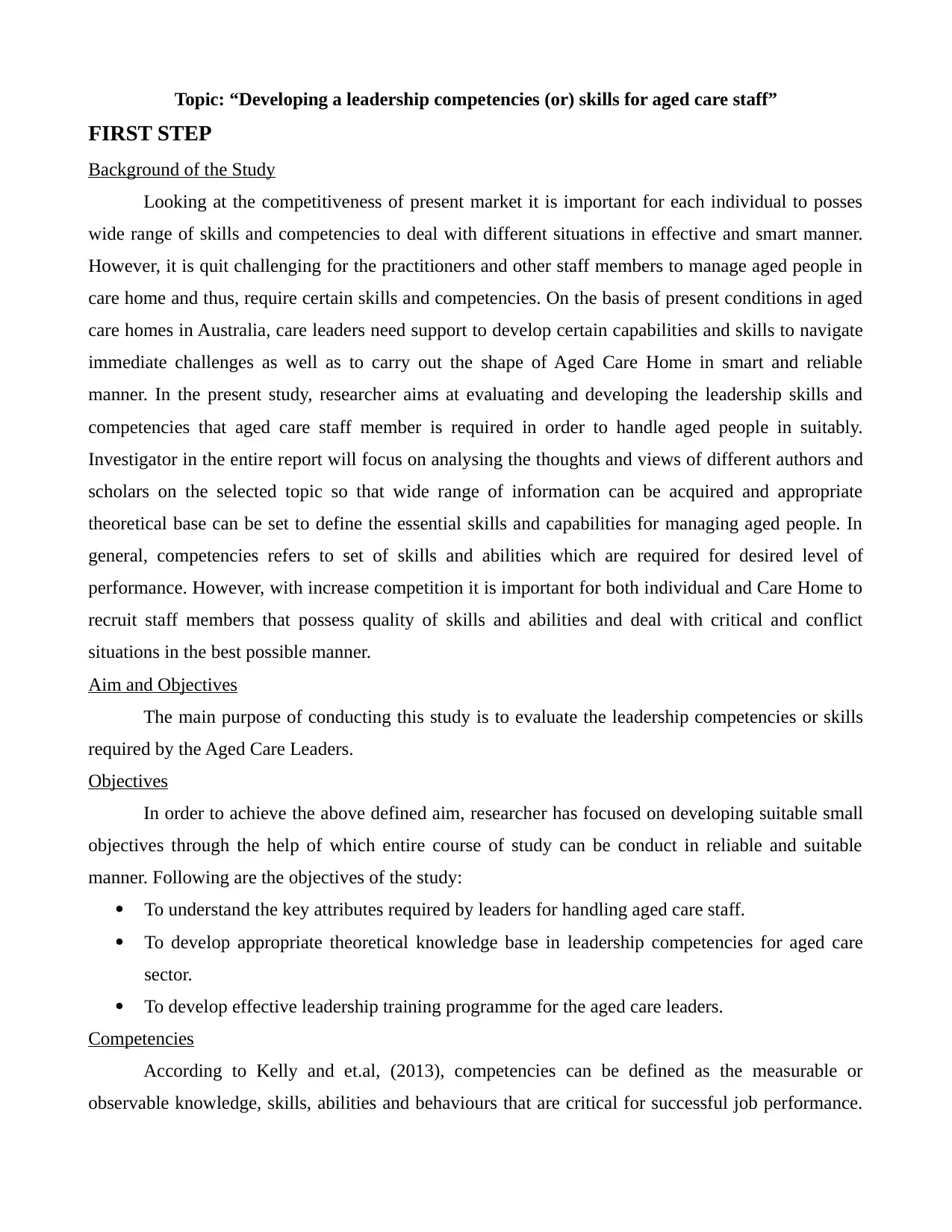
Topic: “Developing a leadership competencies (or) skills for aged care staff”
FIRST STEP
Background of the Study
Looking at the competitiveness of present market it is important for each individual to posses
wide range of skills and competencies to deal with different situations in effective and smart manner.
However, it is quit challenging for the practitioners and other staff members to manage aged people in
care home and thus, require certain skills and competencies. On the basis of present conditions in aged
care homes in Australia, care leaders need support to develop certain capabilities and skills to navigate
immediate challenges as well as to carry out the shape of Aged Care Home in smart and reliable
manner. In the present study, researcher aims at evaluating and developing the leadership skills and
competencies that aged care staff member is required in order to handle aged people in suitably.
Investigator in the entire report will focus on analysing the thoughts and views of different authors and
scholars on the selected topic so that wide range of information can be acquired and appropriate
theoretical base can be set to define the essential skills and capabilities for managing aged people. In
general, competencies refers to set of skills and abilities which are required for desired level of
performance. However, with increase competition it is important for both individual and Care Home to
recruit staff members that possess quality of skills and abilities and deal with critical and conflict
situations in the best possible manner.
Aim and Objectives
The main purpose of conducting this study is to evaluate the leadership competencies or skills
required by the Aged Care Leaders.
Objectives
In order to achieve the above defined aim, researcher has focused on developing suitable small
objectives through the help of which entire course of study can be conduct in reliable and suitable
manner. Following are the objectives of the study:
To understand the key attributes required by leaders for handling aged care staff.
To develop appropriate theoretical knowledge base in leadership competencies for aged care
sector.
To develop effective leadership training programme for the aged care leaders.
Competencies
According to Kelly and et.al, (2013), competencies can be defined as the measurable or
observable knowledge, skills, abilities and behaviours that are critical for successful job performance.
FIRST STEP
Background of the Study
Looking at the competitiveness of present market it is important for each individual to posses
wide range of skills and competencies to deal with different situations in effective and smart manner.
However, it is quit challenging for the practitioners and other staff members to manage aged people in
care home and thus, require certain skills and competencies. On the basis of present conditions in aged
care homes in Australia, care leaders need support to develop certain capabilities and skills to navigate
immediate challenges as well as to carry out the shape of Aged Care Home in smart and reliable
manner. In the present study, researcher aims at evaluating and developing the leadership skills and
competencies that aged care staff member is required in order to handle aged people in suitably.
Investigator in the entire report will focus on analysing the thoughts and views of different authors and
scholars on the selected topic so that wide range of information can be acquired and appropriate
theoretical base can be set to define the essential skills and capabilities for managing aged people. In
general, competencies refers to set of skills and abilities which are required for desired level of
performance. However, with increase competition it is important for both individual and Care Home to
recruit staff members that possess quality of skills and abilities and deal with critical and conflict
situations in the best possible manner.
Aim and Objectives
The main purpose of conducting this study is to evaluate the leadership competencies or skills
required by the Aged Care Leaders.
Objectives
In order to achieve the above defined aim, researcher has focused on developing suitable small
objectives through the help of which entire course of study can be conduct in reliable and suitable
manner. Following are the objectives of the study:
To understand the key attributes required by leaders for handling aged care staff.
To develop appropriate theoretical knowledge base in leadership competencies for aged care
sector.
To develop effective leadership training programme for the aged care leaders.
Competencies
According to Kelly and et.al, (2013), competencies can be defined as the measurable or
observable knowledge, skills, abilities and behaviours that are critical for successful job performance.
⊘ This is a preview!⊘
Do you want full access?
Subscribe today to unlock all pages.

Trusted by 1+ million students worldwide
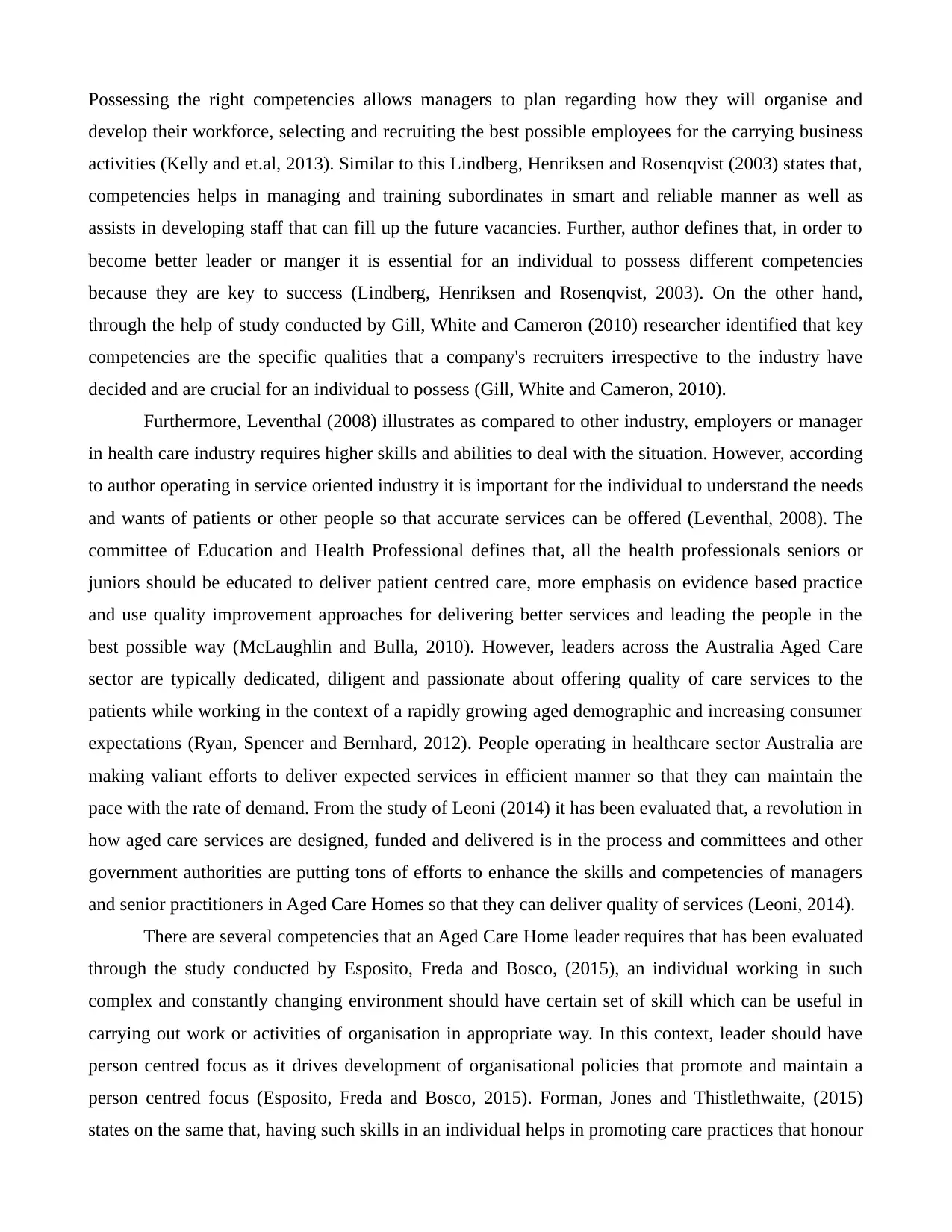
Possessing the right competencies allows managers to plan regarding how they will organise and
develop their workforce, selecting and recruiting the best possible employees for the carrying business
activities (Kelly and et.al, 2013). Similar to this Lindberg, Henriksen and Rosenqvist (2003) states that,
competencies helps in managing and training subordinates in smart and reliable manner as well as
assists in developing staff that can fill up the future vacancies. Further, author defines that, in order to
become better leader or manger it is essential for an individual to possess different competencies
because they are key to success (Lindberg, Henriksen and Rosenqvist, 2003). On the other hand,
through the help of study conducted by Gill, White and Cameron (2010) researcher identified that key
competencies are the specific qualities that a company's recruiters irrespective to the industry have
decided and are crucial for an individual to possess (Gill, White and Cameron, 2010).
Furthermore, Leventhal (2008) illustrates as compared to other industry, employers or manager
in health care industry requires higher skills and abilities to deal with the situation. However, according
to author operating in service oriented industry it is important for the individual to understand the needs
and wants of patients or other people so that accurate services can be offered (Leventhal, 2008). The
committee of Education and Health Professional defines that, all the health professionals seniors or
juniors should be educated to deliver patient centred care, more emphasis on evidence based practice
and use quality improvement approaches for delivering better services and leading the people in the
best possible way (McLaughlin and Bulla, 2010). However, leaders across the Australia Aged Care
sector are typically dedicated, diligent and passionate about offering quality of care services to the
patients while working in the context of a rapidly growing aged demographic and increasing consumer
expectations (Ryan, Spencer and Bernhard, 2012). People operating in healthcare sector Australia are
making valiant efforts to deliver expected services in efficient manner so that they can maintain the
pace with the rate of demand. From the study of Leoni (2014) it has been evaluated that, a revolution in
how aged care services are designed, funded and delivered is in the process and committees and other
government authorities are putting tons of efforts to enhance the skills and competencies of managers
and senior practitioners in Aged Care Homes so that they can deliver quality of services (Leoni, 2014).
There are several competencies that an Aged Care Home leader requires that has been evaluated
through the study conducted by Esposito, Freda and Bosco, (2015), an individual working in such
complex and constantly changing environment should have certain set of skill which can be useful in
carrying out work or activities of organisation in appropriate way. In this context, leader should have
person centred focus as it drives development of organisational policies that promote and maintain a
person centred focus (Esposito, Freda and Bosco, 2015). Forman, Jones and Thistlethwaite, (2015)
states on the same that, having such skills in an individual helps in promoting care practices that honour
develop their workforce, selecting and recruiting the best possible employees for the carrying business
activities (Kelly and et.al, 2013). Similar to this Lindberg, Henriksen and Rosenqvist (2003) states that,
competencies helps in managing and training subordinates in smart and reliable manner as well as
assists in developing staff that can fill up the future vacancies. Further, author defines that, in order to
become better leader or manger it is essential for an individual to possess different competencies
because they are key to success (Lindberg, Henriksen and Rosenqvist, 2003). On the other hand,
through the help of study conducted by Gill, White and Cameron (2010) researcher identified that key
competencies are the specific qualities that a company's recruiters irrespective to the industry have
decided and are crucial for an individual to possess (Gill, White and Cameron, 2010).
Furthermore, Leventhal (2008) illustrates as compared to other industry, employers or manager
in health care industry requires higher skills and abilities to deal with the situation. However, according
to author operating in service oriented industry it is important for the individual to understand the needs
and wants of patients or other people so that accurate services can be offered (Leventhal, 2008). The
committee of Education and Health Professional defines that, all the health professionals seniors or
juniors should be educated to deliver patient centred care, more emphasis on evidence based practice
and use quality improvement approaches for delivering better services and leading the people in the
best possible way (McLaughlin and Bulla, 2010). However, leaders across the Australia Aged Care
sector are typically dedicated, diligent and passionate about offering quality of care services to the
patients while working in the context of a rapidly growing aged demographic and increasing consumer
expectations (Ryan, Spencer and Bernhard, 2012). People operating in healthcare sector Australia are
making valiant efforts to deliver expected services in efficient manner so that they can maintain the
pace with the rate of demand. From the study of Leoni (2014) it has been evaluated that, a revolution in
how aged care services are designed, funded and delivered is in the process and committees and other
government authorities are putting tons of efforts to enhance the skills and competencies of managers
and senior practitioners in Aged Care Homes so that they can deliver quality of services (Leoni, 2014).
There are several competencies that an Aged Care Home leader requires that has been evaluated
through the study conducted by Esposito, Freda and Bosco, (2015), an individual working in such
complex and constantly changing environment should have certain set of skill which can be useful in
carrying out work or activities of organisation in appropriate way. In this context, leader should have
person centred focus as it drives development of organisational policies that promote and maintain a
person centred focus (Esposito, Freda and Bosco, 2015). Forman, Jones and Thistlethwaite, (2015)
states on the same that, having such skills in an individual helps in promoting care practices that honour
Paraphrase This Document
Need a fresh take? Get an instant paraphrase of this document with our AI Paraphraser
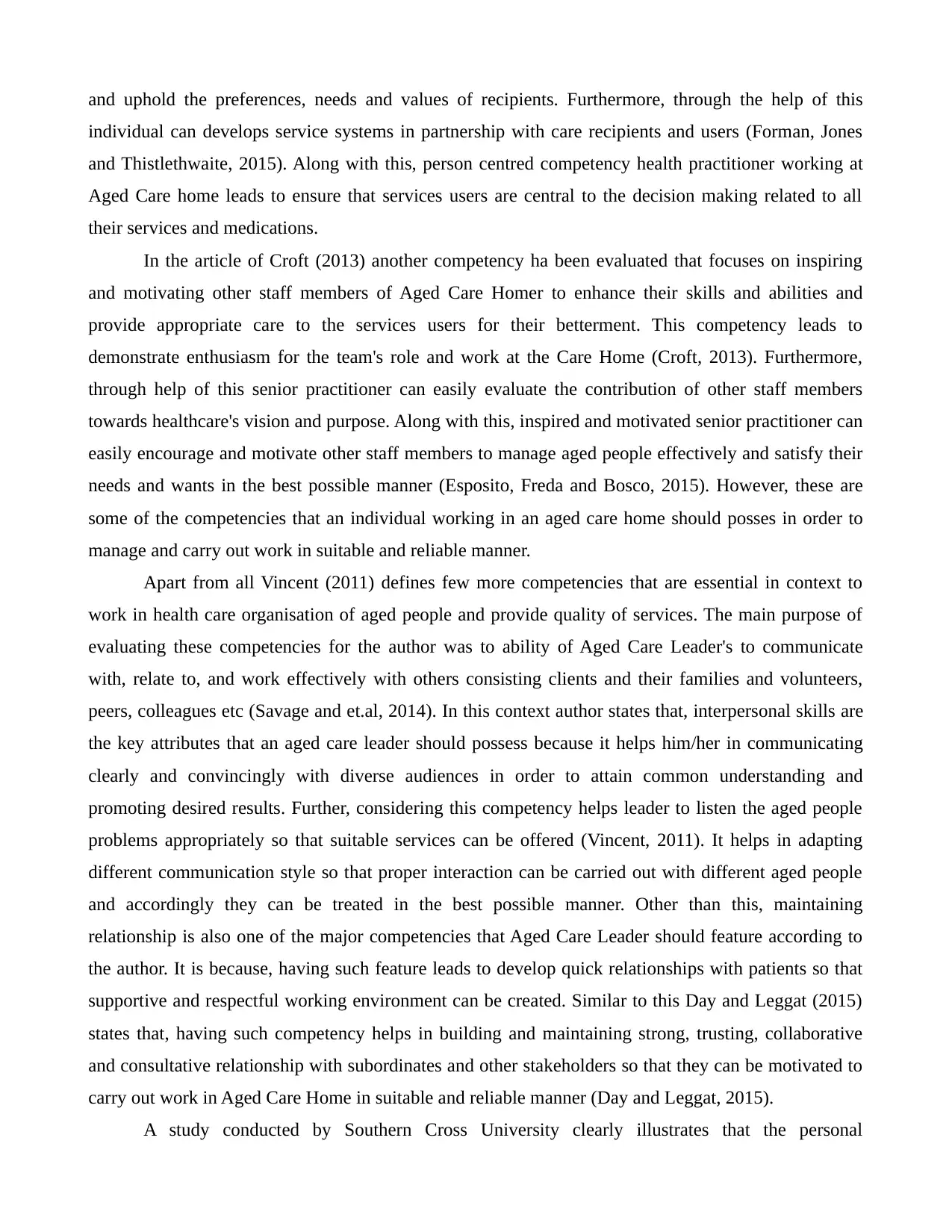
and uphold the preferences, needs and values of recipients. Furthermore, through the help of this
individual can develops service systems in partnership with care recipients and users (Forman, Jones
and Thistlethwaite, 2015). Along with this, person centred competency health practitioner working at
Aged Care home leads to ensure that services users are central to the decision making related to all
their services and medications.
In the article of Croft (2013) another competency ha been evaluated that focuses on inspiring
and motivating other staff members of Aged Care Homer to enhance their skills and abilities and
provide appropriate care to the services users for their betterment. This competency leads to
demonstrate enthusiasm for the team's role and work at the Care Home (Croft, 2013). Furthermore,
through help of this senior practitioner can easily evaluate the contribution of other staff members
towards healthcare's vision and purpose. Along with this, inspired and motivated senior practitioner can
easily encourage and motivate other staff members to manage aged people effectively and satisfy their
needs and wants in the best possible manner (Esposito, Freda and Bosco, 2015). However, these are
some of the competencies that an individual working in an aged care home should posses in order to
manage and carry out work in suitable and reliable manner.
Apart from all Vincent (2011) defines few more competencies that are essential in context to
work in health care organisation of aged people and provide quality of services. The main purpose of
evaluating these competencies for the author was to ability of Aged Care Leader's to communicate
with, relate to, and work effectively with others consisting clients and their families and volunteers,
peers, colleagues etc (Savage and et.al, 2014). In this context author states that, interpersonal skills are
the key attributes that an aged care leader should possess because it helps him/her in communicating
clearly and convincingly with diverse audiences in order to attain common understanding and
promoting desired results. Further, considering this competency helps leader to listen the aged people
problems appropriately so that suitable services can be offered (Vincent, 2011). It helps in adapting
different communication style so that proper interaction can be carried out with different aged people
and accordingly they can be treated in the best possible manner. Other than this, maintaining
relationship is also one of the major competencies that Aged Care Leader should feature according to
the author. It is because, having such feature leads to develop quick relationships with patients so that
supportive and respectful working environment can be created. Similar to this Day and Leggat (2015)
states that, having such competency helps in building and maintaining strong, trusting, collaborative
and consultative relationship with subordinates and other stakeholders so that they can be motivated to
carry out work in Aged Care Home in suitable and reliable manner (Day and Leggat, 2015).
A study conducted by Southern Cross University clearly illustrates that the personal
individual can develops service systems in partnership with care recipients and users (Forman, Jones
and Thistlethwaite, 2015). Along with this, person centred competency health practitioner working at
Aged Care home leads to ensure that services users are central to the decision making related to all
their services and medications.
In the article of Croft (2013) another competency ha been evaluated that focuses on inspiring
and motivating other staff members of Aged Care Homer to enhance their skills and abilities and
provide appropriate care to the services users for their betterment. This competency leads to
demonstrate enthusiasm for the team's role and work at the Care Home (Croft, 2013). Furthermore,
through help of this senior practitioner can easily evaluate the contribution of other staff members
towards healthcare's vision and purpose. Along with this, inspired and motivated senior practitioner can
easily encourage and motivate other staff members to manage aged people effectively and satisfy their
needs and wants in the best possible manner (Esposito, Freda and Bosco, 2015). However, these are
some of the competencies that an individual working in an aged care home should posses in order to
manage and carry out work in suitable and reliable manner.
Apart from all Vincent (2011) defines few more competencies that are essential in context to
work in health care organisation of aged people and provide quality of services. The main purpose of
evaluating these competencies for the author was to ability of Aged Care Leader's to communicate
with, relate to, and work effectively with others consisting clients and their families and volunteers,
peers, colleagues etc (Savage and et.al, 2014). In this context author states that, interpersonal skills are
the key attributes that an aged care leader should possess because it helps him/her in communicating
clearly and convincingly with diverse audiences in order to attain common understanding and
promoting desired results. Further, considering this competency helps leader to listen the aged people
problems appropriately so that suitable services can be offered (Vincent, 2011). It helps in adapting
different communication style so that proper interaction can be carried out with different aged people
and accordingly they can be treated in the best possible manner. Other than this, maintaining
relationship is also one of the major competencies that Aged Care Leader should feature according to
the author. It is because, having such feature leads to develop quick relationships with patients so that
supportive and respectful working environment can be created. Similar to this Day and Leggat (2015)
states that, having such competency helps in building and maintaining strong, trusting, collaborative
and consultative relationship with subordinates and other stakeholders so that they can be motivated to
carry out work in Aged Care Home in suitable and reliable manner (Day and Leggat, 2015).
A study conducted by Southern Cross University clearly illustrates that the personal
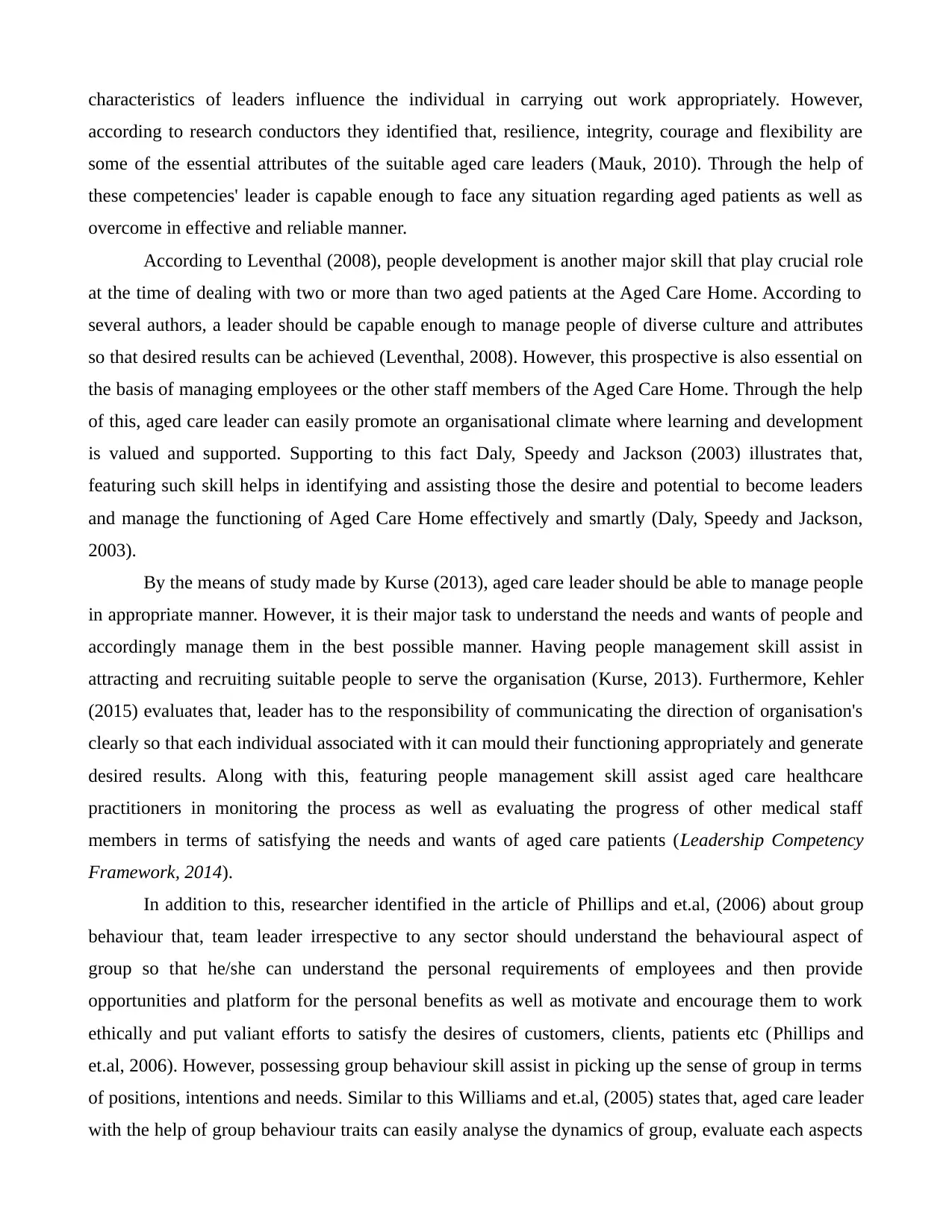
characteristics of leaders influence the individual in carrying out work appropriately. However,
according to research conductors they identified that, resilience, integrity, courage and flexibility are
some of the essential attributes of the suitable aged care leaders (Mauk, 2010). Through the help of
these competencies' leader is capable enough to face any situation regarding aged patients as well as
overcome in effective and reliable manner.
According to Leventhal (2008), people development is another major skill that play crucial role
at the time of dealing with two or more than two aged patients at the Aged Care Home. According to
several authors, a leader should be capable enough to manage people of diverse culture and attributes
so that desired results can be achieved (Leventhal, 2008). However, this prospective is also essential on
the basis of managing employees or the other staff members of the Aged Care Home. Through the help
of this, aged care leader can easily promote an organisational climate where learning and development
is valued and supported. Supporting to this fact Daly, Speedy and Jackson (2003) illustrates that,
featuring such skill helps in identifying and assisting those the desire and potential to become leaders
and manage the functioning of Aged Care Home effectively and smartly (Daly, Speedy and Jackson,
2003).
By the means of study made by Kurse (2013), aged care leader should be able to manage people
in appropriate manner. However, it is their major task to understand the needs and wants of people and
accordingly manage them in the best possible manner. Having people management skill assist in
attracting and recruiting suitable people to serve the organisation (Kurse, 2013). Furthermore, Kehler
(2015) evaluates that, leader has to the responsibility of communicating the direction of organisation's
clearly so that each individual associated with it can mould their functioning appropriately and generate
desired results. Along with this, featuring people management skill assist aged care healthcare
practitioners in monitoring the process as well as evaluating the progress of other medical staff
members in terms of satisfying the needs and wants of aged care patients (Leadership Competency
Framework, 2014).
In addition to this, researcher identified in the article of Phillips and et.al, (2006) about group
behaviour that, team leader irrespective to any sector should understand the behavioural aspect of
group so that he/she can understand the personal requirements of employees and then provide
opportunities and platform for the personal benefits as well as motivate and encourage them to work
ethically and put valiant efforts to satisfy the desires of customers, clients, patients etc (Phillips and
et.al, 2006). However, possessing group behaviour skill assist in picking up the sense of group in terms
of positions, intentions and needs. Similar to this Williams and et.al, (2005) states that, aged care leader
with the help of group behaviour traits can easily analyse the dynamics of group, evaluate each aspects
according to research conductors they identified that, resilience, integrity, courage and flexibility are
some of the essential attributes of the suitable aged care leaders (Mauk, 2010). Through the help of
these competencies' leader is capable enough to face any situation regarding aged patients as well as
overcome in effective and reliable manner.
According to Leventhal (2008), people development is another major skill that play crucial role
at the time of dealing with two or more than two aged patients at the Aged Care Home. According to
several authors, a leader should be capable enough to manage people of diverse culture and attributes
so that desired results can be achieved (Leventhal, 2008). However, this prospective is also essential on
the basis of managing employees or the other staff members of the Aged Care Home. Through the help
of this, aged care leader can easily promote an organisational climate where learning and development
is valued and supported. Supporting to this fact Daly, Speedy and Jackson (2003) illustrates that,
featuring such skill helps in identifying and assisting those the desire and potential to become leaders
and manage the functioning of Aged Care Home effectively and smartly (Daly, Speedy and Jackson,
2003).
By the means of study made by Kurse (2013), aged care leader should be able to manage people
in appropriate manner. However, it is their major task to understand the needs and wants of people and
accordingly manage them in the best possible manner. Having people management skill assist in
attracting and recruiting suitable people to serve the organisation (Kurse, 2013). Furthermore, Kehler
(2015) evaluates that, leader has to the responsibility of communicating the direction of organisation's
clearly so that each individual associated with it can mould their functioning appropriately and generate
desired results. Along with this, featuring people management skill assist aged care healthcare
practitioners in monitoring the process as well as evaluating the progress of other medical staff
members in terms of satisfying the needs and wants of aged care patients (Leadership Competency
Framework, 2014).
In addition to this, researcher identified in the article of Phillips and et.al, (2006) about group
behaviour that, team leader irrespective to any sector should understand the behavioural aspect of
group so that he/she can understand the personal requirements of employees and then provide
opportunities and platform for the personal benefits as well as motivate and encourage them to work
ethically and put valiant efforts to satisfy the desires of customers, clients, patients etc (Phillips and
et.al, 2006). However, possessing group behaviour skill assist in picking up the sense of group in terms
of positions, intentions and needs. Similar to this Williams and et.al, (2005) states that, aged care leader
with the help of group behaviour traits can easily analyse the dynamics of group, evaluate each aspects
⊘ This is a preview!⊘
Do you want full access?
Subscribe today to unlock all pages.

Trusted by 1+ million students worldwide
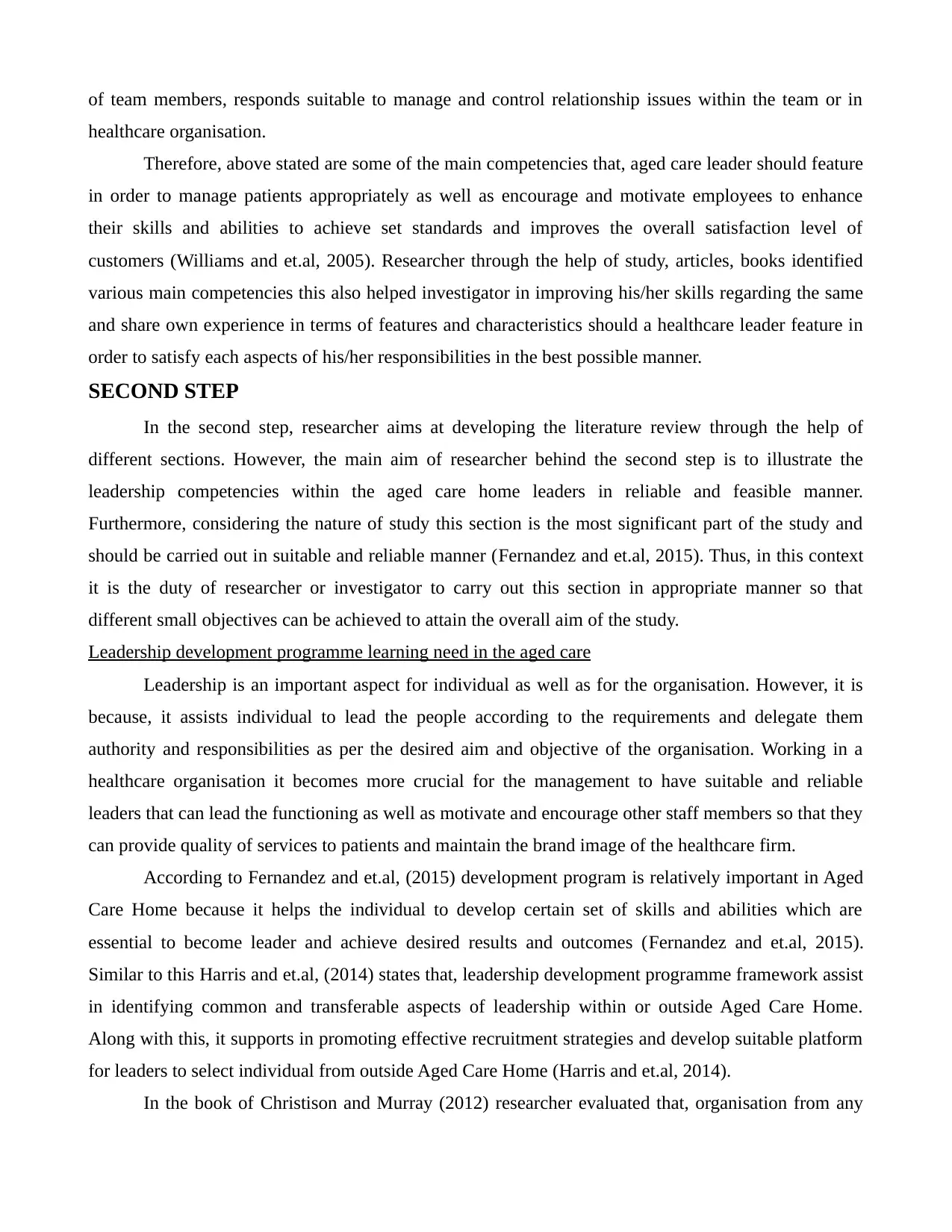
of team members, responds suitable to manage and control relationship issues within the team or in
healthcare organisation.
Therefore, above stated are some of the main competencies that, aged care leader should feature
in order to manage patients appropriately as well as encourage and motivate employees to enhance
their skills and abilities to achieve set standards and improves the overall satisfaction level of
customers (Williams and et.al, 2005). Researcher through the help of study, articles, books identified
various main competencies this also helped investigator in improving his/her skills regarding the same
and share own experience in terms of features and characteristics should a healthcare leader feature in
order to satisfy each aspects of his/her responsibilities in the best possible manner.
SECOND STEP
In the second step, researcher aims at developing the literature review through the help of
different sections. However, the main aim of researcher behind the second step is to illustrate the
leadership competencies within the aged care home leaders in reliable and feasible manner.
Furthermore, considering the nature of study this section is the most significant part of the study and
should be carried out in suitable and reliable manner (Fernandez and et.al, 2015). Thus, in this context
it is the duty of researcher or investigator to carry out this section in appropriate manner so that
different small objectives can be achieved to attain the overall aim of the study.
Leadership development programme learning need in the aged care
Leadership is an important aspect for individual as well as for the organisation. However, it is
because, it assists individual to lead the people according to the requirements and delegate them
authority and responsibilities as per the desired aim and objective of the organisation. Working in a
healthcare organisation it becomes more crucial for the management to have suitable and reliable
leaders that can lead the functioning as well as motivate and encourage other staff members so that they
can provide quality of services to patients and maintain the brand image of the healthcare firm.
According to Fernandez and et.al, (2015) development program is relatively important in Aged
Care Home because it helps the individual to develop certain set of skills and abilities which are
essential to become leader and achieve desired results and outcomes (Fernandez and et.al, 2015).
Similar to this Harris and et.al, (2014) states that, leadership development programme framework assist
in identifying common and transferable aspects of leadership within or outside Aged Care Home.
Along with this, it supports in promoting effective recruitment strategies and develop suitable platform
for leaders to select individual from outside Aged Care Home (Harris and et.al, 2014).
In the book of Christison and Murray (2012) researcher evaluated that, organisation from any
healthcare organisation.
Therefore, above stated are some of the main competencies that, aged care leader should feature
in order to manage patients appropriately as well as encourage and motivate employees to enhance
their skills and abilities to achieve set standards and improves the overall satisfaction level of
customers (Williams and et.al, 2005). Researcher through the help of study, articles, books identified
various main competencies this also helped investigator in improving his/her skills regarding the same
and share own experience in terms of features and characteristics should a healthcare leader feature in
order to satisfy each aspects of his/her responsibilities in the best possible manner.
SECOND STEP
In the second step, researcher aims at developing the literature review through the help of
different sections. However, the main aim of researcher behind the second step is to illustrate the
leadership competencies within the aged care home leaders in reliable and feasible manner.
Furthermore, considering the nature of study this section is the most significant part of the study and
should be carried out in suitable and reliable manner (Fernandez and et.al, 2015). Thus, in this context
it is the duty of researcher or investigator to carry out this section in appropriate manner so that
different small objectives can be achieved to attain the overall aim of the study.
Leadership development programme learning need in the aged care
Leadership is an important aspect for individual as well as for the organisation. However, it is
because, it assists individual to lead the people according to the requirements and delegate them
authority and responsibilities as per the desired aim and objective of the organisation. Working in a
healthcare organisation it becomes more crucial for the management to have suitable and reliable
leaders that can lead the functioning as well as motivate and encourage other staff members so that they
can provide quality of services to patients and maintain the brand image of the healthcare firm.
According to Fernandez and et.al, (2015) development program is relatively important in Aged
Care Home because it helps the individual to develop certain set of skills and abilities which are
essential to become leader and achieve desired results and outcomes (Fernandez and et.al, 2015).
Similar to this Harris and et.al, (2014) states that, leadership development programme framework assist
in identifying common and transferable aspects of leadership within or outside Aged Care Home.
Along with this, it supports in promoting effective recruitment strategies and develop suitable platform
for leaders to select individual from outside Aged Care Home (Harris and et.al, 2014).
In the book of Christison and Murray (2012) researcher evaluated that, organisation from any
Paraphrase This Document
Need a fresh take? Get an instant paraphrase of this document with our AI Paraphraser
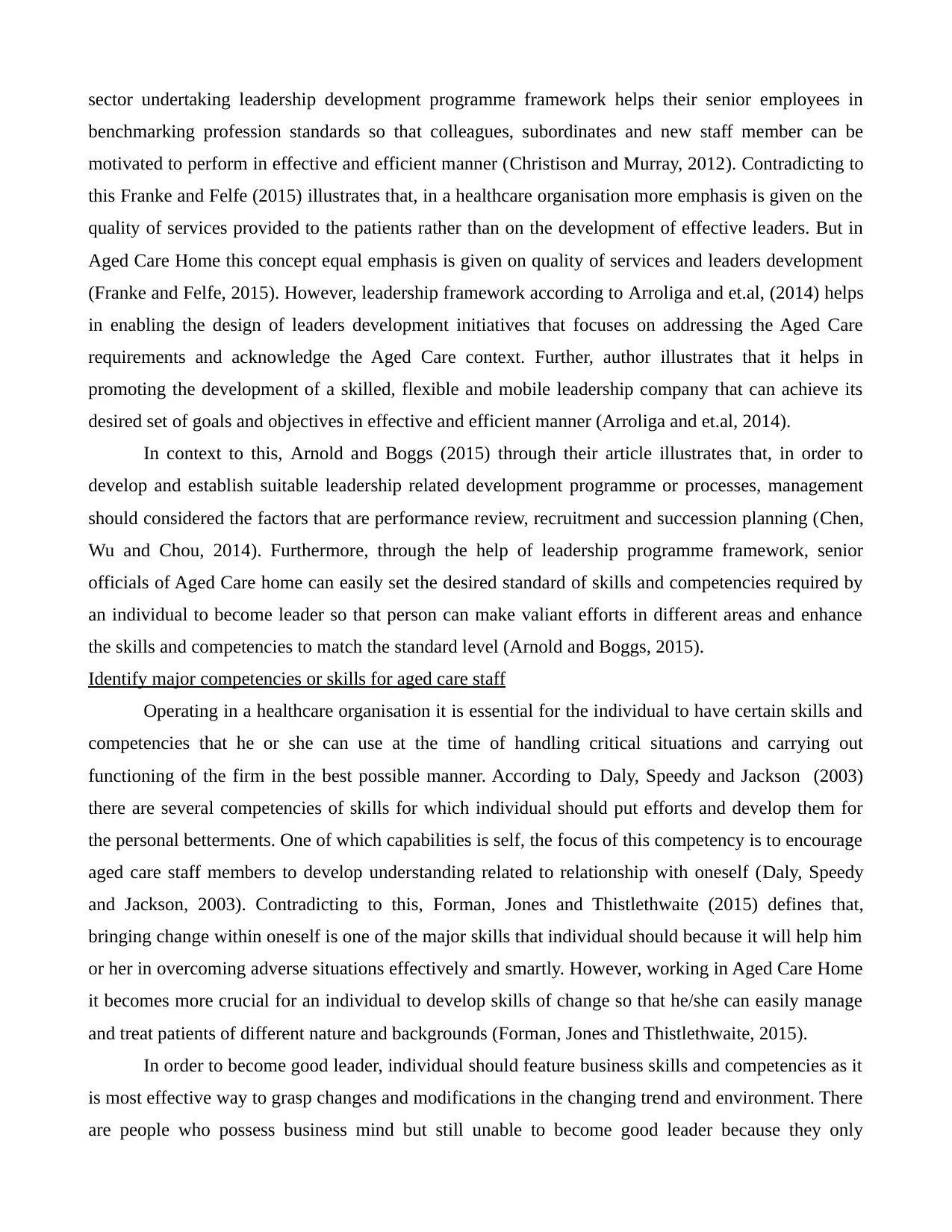
sector undertaking leadership development programme framework helps their senior employees in
benchmarking profession standards so that colleagues, subordinates and new staff member can be
motivated to perform in effective and efficient manner (Christison and Murray, 2012). Contradicting to
this Franke and Felfe (2015) illustrates that, in a healthcare organisation more emphasis is given on the
quality of services provided to the patients rather than on the development of effective leaders. But in
Aged Care Home this concept equal emphasis is given on quality of services and leaders development
(Franke and Felfe, 2015). However, leadership framework according to Arroliga and et.al, (2014) helps
in enabling the design of leaders development initiatives that focuses on addressing the Aged Care
requirements and acknowledge the Aged Care context. Further, author illustrates that it helps in
promoting the development of a skilled, flexible and mobile leadership company that can achieve its
desired set of goals and objectives in effective and efficient manner (Arroliga and et.al, 2014).
In context to this, Arnold and Boggs (2015) through their article illustrates that, in order to
develop and establish suitable leadership related development programme or processes, management
should considered the factors that are performance review, recruitment and succession planning (Chen,
Wu and Chou, 2014). Furthermore, through the help of leadership programme framework, senior
officials of Aged Care home can easily set the desired standard of skills and competencies required by
an individual to become leader so that person can make valiant efforts in different areas and enhance
the skills and competencies to match the standard level (Arnold and Boggs, 2015).
Identify major competencies or skills for aged care staff
Operating in a healthcare organisation it is essential for the individual to have certain skills and
competencies that he or she can use at the time of handling critical situations and carrying out
functioning of the firm in the best possible manner. According to Daly, Speedy and Jackson (2003)
there are several competencies of skills for which individual should put efforts and develop them for
the personal betterments. One of which capabilities is self, the focus of this competency is to encourage
aged care staff members to develop understanding related to relationship with oneself (Daly, Speedy
and Jackson, 2003). Contradicting to this, Forman, Jones and Thistlethwaite (2015) defines that,
bringing change within oneself is one of the major skills that individual should because it will help him
or her in overcoming adverse situations effectively and smartly. However, working in Aged Care Home
it becomes more crucial for an individual to develop skills of change so that he/she can easily manage
and treat patients of different nature and backgrounds (Forman, Jones and Thistlethwaite, 2015).
In order to become good leader, individual should feature business skills and competencies as it
is most effective way to grasp changes and modifications in the changing trend and environment. There
are people who possess business mind but still unable to become good leader because they only
benchmarking profession standards so that colleagues, subordinates and new staff member can be
motivated to perform in effective and efficient manner (Christison and Murray, 2012). Contradicting to
this Franke and Felfe (2015) illustrates that, in a healthcare organisation more emphasis is given on the
quality of services provided to the patients rather than on the development of effective leaders. But in
Aged Care Home this concept equal emphasis is given on quality of services and leaders development
(Franke and Felfe, 2015). However, leadership framework according to Arroliga and et.al, (2014) helps
in enabling the design of leaders development initiatives that focuses on addressing the Aged Care
requirements and acknowledge the Aged Care context. Further, author illustrates that it helps in
promoting the development of a skilled, flexible and mobile leadership company that can achieve its
desired set of goals and objectives in effective and efficient manner (Arroliga and et.al, 2014).
In context to this, Arnold and Boggs (2015) through their article illustrates that, in order to
develop and establish suitable leadership related development programme or processes, management
should considered the factors that are performance review, recruitment and succession planning (Chen,
Wu and Chou, 2014). Furthermore, through the help of leadership programme framework, senior
officials of Aged Care home can easily set the desired standard of skills and competencies required by
an individual to become leader so that person can make valiant efforts in different areas and enhance
the skills and competencies to match the standard level (Arnold and Boggs, 2015).
Identify major competencies or skills for aged care staff
Operating in a healthcare organisation it is essential for the individual to have certain skills and
competencies that he or she can use at the time of handling critical situations and carrying out
functioning of the firm in the best possible manner. According to Daly, Speedy and Jackson (2003)
there are several competencies of skills for which individual should put efforts and develop them for
the personal betterments. One of which capabilities is self, the focus of this competency is to encourage
aged care staff members to develop understanding related to relationship with oneself (Daly, Speedy
and Jackson, 2003). Contradicting to this, Forman, Jones and Thistlethwaite (2015) defines that,
bringing change within oneself is one of the major skills that individual should because it will help him
or her in overcoming adverse situations effectively and smartly. However, working in Aged Care Home
it becomes more crucial for an individual to develop skills of change so that he/she can easily manage
and treat patients of different nature and backgrounds (Forman, Jones and Thistlethwaite, 2015).
In order to become good leader, individual should feature business skills and competencies as it
is most effective way to grasp changes and modifications in the changing trend and environment. There
are people who possess business mind but still unable to become good leader because they only
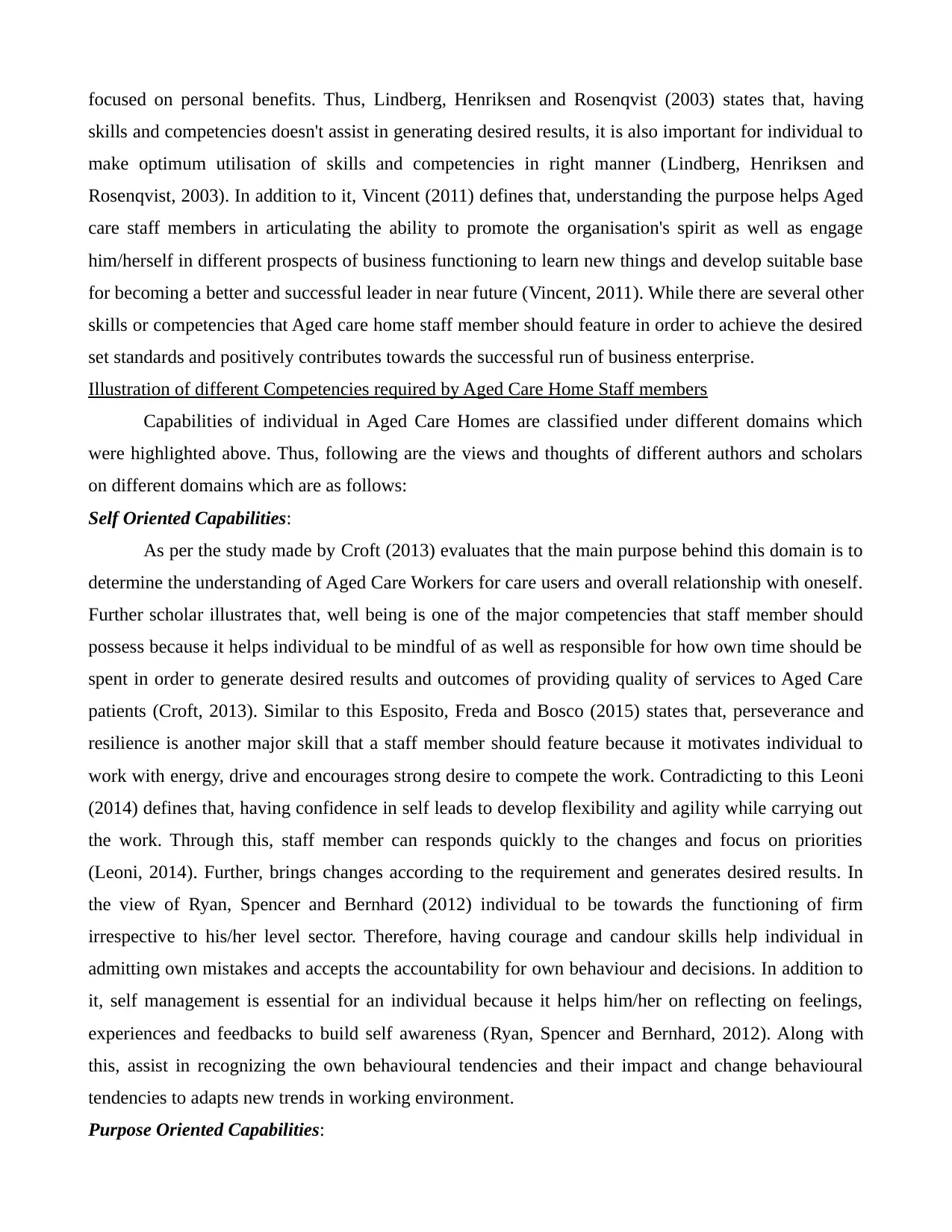
focused on personal benefits. Thus, Lindberg, Henriksen and Rosenqvist (2003) states that, having
skills and competencies doesn't assist in generating desired results, it is also important for individual to
make optimum utilisation of skills and competencies in right manner (Lindberg, Henriksen and
Rosenqvist, 2003). In addition to it, Vincent (2011) defines that, understanding the purpose helps Aged
care staff members in articulating the ability to promote the organisation's spirit as well as engage
him/herself in different prospects of business functioning to learn new things and develop suitable base
for becoming a better and successful leader in near future (Vincent, 2011). While there are several other
skills or competencies that Aged care home staff member should feature in order to achieve the desired
set standards and positively contributes towards the successful run of business enterprise.
Illustration of different Competencies required by Aged Care Home Staff members
Capabilities of individual in Aged Care Homes are classified under different domains which
were highlighted above. Thus, following are the views and thoughts of different authors and scholars
on different domains which are as follows:
Self Oriented Capabilities:
As per the study made by Croft (2013) evaluates that the main purpose behind this domain is to
determine the understanding of Aged Care Workers for care users and overall relationship with oneself.
Further scholar illustrates that, well being is one of the major competencies that staff member should
possess because it helps individual to be mindful of as well as responsible for how own time should be
spent in order to generate desired results and outcomes of providing quality of services to Aged Care
patients (Croft, 2013). Similar to this Esposito, Freda and Bosco (2015) states that, perseverance and
resilience is another major skill that a staff member should feature because it motivates individual to
work with energy, drive and encourages strong desire to compete the work. Contradicting to this Leoni
(2014) defines that, having confidence in self leads to develop flexibility and agility while carrying out
the work. Through this, staff member can responds quickly to the changes and focus on priorities
(Leoni, 2014). Further, brings changes according to the requirement and generates desired results. In
the view of Ryan, Spencer and Bernhard (2012) individual to be towards the functioning of firm
irrespective to his/her level sector. Therefore, having courage and candour skills help individual in
admitting own mistakes and accepts the accountability for own behaviour and decisions. In addition to
it, self management is essential for an individual because it helps him/her on reflecting on feelings,
experiences and feedbacks to build self awareness (Ryan, Spencer and Bernhard, 2012). Along with
this, assist in recognizing the own behavioural tendencies and their impact and change behavioural
tendencies to adapts new trends in working environment.
Purpose Oriented Capabilities:
skills and competencies doesn't assist in generating desired results, it is also important for individual to
make optimum utilisation of skills and competencies in right manner (Lindberg, Henriksen and
Rosenqvist, 2003). In addition to it, Vincent (2011) defines that, understanding the purpose helps Aged
care staff members in articulating the ability to promote the organisation's spirit as well as engage
him/herself in different prospects of business functioning to learn new things and develop suitable base
for becoming a better and successful leader in near future (Vincent, 2011). While there are several other
skills or competencies that Aged care home staff member should feature in order to achieve the desired
set standards and positively contributes towards the successful run of business enterprise.
Illustration of different Competencies required by Aged Care Home Staff members
Capabilities of individual in Aged Care Homes are classified under different domains which
were highlighted above. Thus, following are the views and thoughts of different authors and scholars
on different domains which are as follows:
Self Oriented Capabilities:
As per the study made by Croft (2013) evaluates that the main purpose behind this domain is to
determine the understanding of Aged Care Workers for care users and overall relationship with oneself.
Further scholar illustrates that, well being is one of the major competencies that staff member should
possess because it helps individual to be mindful of as well as responsible for how own time should be
spent in order to generate desired results and outcomes of providing quality of services to Aged Care
patients (Croft, 2013). Similar to this Esposito, Freda and Bosco (2015) states that, perseverance and
resilience is another major skill that a staff member should feature because it motivates individual to
work with energy, drive and encourages strong desire to compete the work. Contradicting to this Leoni
(2014) defines that, having confidence in self leads to develop flexibility and agility while carrying out
the work. Through this, staff member can responds quickly to the changes and focus on priorities
(Leoni, 2014). Further, brings changes according to the requirement and generates desired results. In
the view of Ryan, Spencer and Bernhard (2012) individual to be towards the functioning of firm
irrespective to his/her level sector. Therefore, having courage and candour skills help individual in
admitting own mistakes and accepts the accountability for own behaviour and decisions. In addition to
it, self management is essential for an individual because it helps him/her on reflecting on feelings,
experiences and feedbacks to build self awareness (Ryan, Spencer and Bernhard, 2012). Along with
this, assist in recognizing the own behavioural tendencies and their impact and change behavioural
tendencies to adapts new trends in working environment.
Purpose Oriented Capabilities:
⊘ This is a preview!⊘
Do you want full access?
Subscribe today to unlock all pages.

Trusted by 1+ million students worldwide
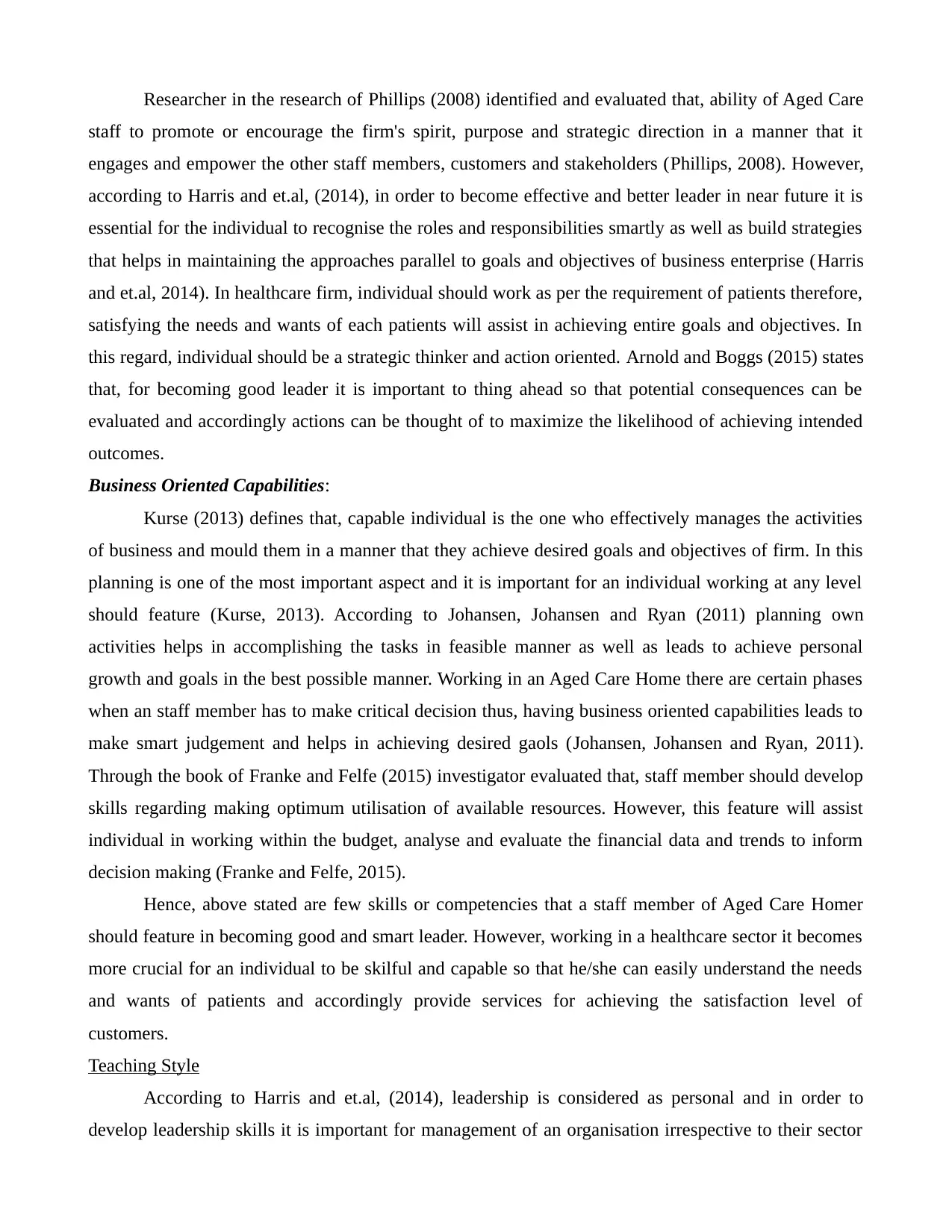
Researcher in the research of Phillips (2008) identified and evaluated that, ability of Aged Care
staff to promote or encourage the firm's spirit, purpose and strategic direction in a manner that it
engages and empower the other staff members, customers and stakeholders (Phillips, 2008). However,
according to Harris and et.al, (2014), in order to become effective and better leader in near future it is
essential for the individual to recognise the roles and responsibilities smartly as well as build strategies
that helps in maintaining the approaches parallel to goals and objectives of business enterprise (Harris
and et.al, 2014). In healthcare firm, individual should work as per the requirement of patients therefore,
satisfying the needs and wants of each patients will assist in achieving entire goals and objectives. In
this regard, individual should be a strategic thinker and action oriented. Arnold and Boggs (2015) states
that, for becoming good leader it is important to thing ahead so that potential consequences can be
evaluated and accordingly actions can be thought of to maximize the likelihood of achieving intended
outcomes.
Business Oriented Capabilities:
Kurse (2013) defines that, capable individual is the one who effectively manages the activities
of business and mould them in a manner that they achieve desired goals and objectives of firm. In this
planning is one of the most important aspect and it is important for an individual working at any level
should feature (Kurse, 2013). According to Johansen, Johansen and Ryan (2011) planning own
activities helps in accomplishing the tasks in feasible manner as well as leads to achieve personal
growth and goals in the best possible manner. Working in an Aged Care Home there are certain phases
when an staff member has to make critical decision thus, having business oriented capabilities leads to
make smart judgement and helps in achieving desired gaols (Johansen, Johansen and Ryan, 2011).
Through the book of Franke and Felfe (2015) investigator evaluated that, staff member should develop
skills regarding making optimum utilisation of available resources. However, this feature will assist
individual in working within the budget, analyse and evaluate the financial data and trends to inform
decision making (Franke and Felfe, 2015).
Hence, above stated are few skills or competencies that a staff member of Aged Care Homer
should feature in becoming good and smart leader. However, working in a healthcare sector it becomes
more crucial for an individual to be skilful and capable so that he/she can easily understand the needs
and wants of patients and accordingly provide services for achieving the satisfaction level of
customers.
Teaching Style
According to Harris and et.al, (2014), leadership is considered as personal and in order to
develop leadership skills it is important for management of an organisation irrespective to their sector
staff to promote or encourage the firm's spirit, purpose and strategic direction in a manner that it
engages and empower the other staff members, customers and stakeholders (Phillips, 2008). However,
according to Harris and et.al, (2014), in order to become effective and better leader in near future it is
essential for the individual to recognise the roles and responsibilities smartly as well as build strategies
that helps in maintaining the approaches parallel to goals and objectives of business enterprise (Harris
and et.al, 2014). In healthcare firm, individual should work as per the requirement of patients therefore,
satisfying the needs and wants of each patients will assist in achieving entire goals and objectives. In
this regard, individual should be a strategic thinker and action oriented. Arnold and Boggs (2015) states
that, for becoming good leader it is important to thing ahead so that potential consequences can be
evaluated and accordingly actions can be thought of to maximize the likelihood of achieving intended
outcomes.
Business Oriented Capabilities:
Kurse (2013) defines that, capable individual is the one who effectively manages the activities
of business and mould them in a manner that they achieve desired goals and objectives of firm. In this
planning is one of the most important aspect and it is important for an individual working at any level
should feature (Kurse, 2013). According to Johansen, Johansen and Ryan (2011) planning own
activities helps in accomplishing the tasks in feasible manner as well as leads to achieve personal
growth and goals in the best possible manner. Working in an Aged Care Home there are certain phases
when an staff member has to make critical decision thus, having business oriented capabilities leads to
make smart judgement and helps in achieving desired gaols (Johansen, Johansen and Ryan, 2011).
Through the book of Franke and Felfe (2015) investigator evaluated that, staff member should develop
skills regarding making optimum utilisation of available resources. However, this feature will assist
individual in working within the budget, analyse and evaluate the financial data and trends to inform
decision making (Franke and Felfe, 2015).
Hence, above stated are few skills or competencies that a staff member of Aged Care Homer
should feature in becoming good and smart leader. However, working in a healthcare sector it becomes
more crucial for an individual to be skilful and capable so that he/she can easily understand the needs
and wants of patients and accordingly provide services for achieving the satisfaction level of
customers.
Teaching Style
According to Harris and et.al, (2014), leadership is considered as personal and in order to
develop leadership skills it is important for management of an organisation irrespective to their sector
Paraphrase This Document
Need a fresh take? Get an instant paraphrase of this document with our AI Paraphraser
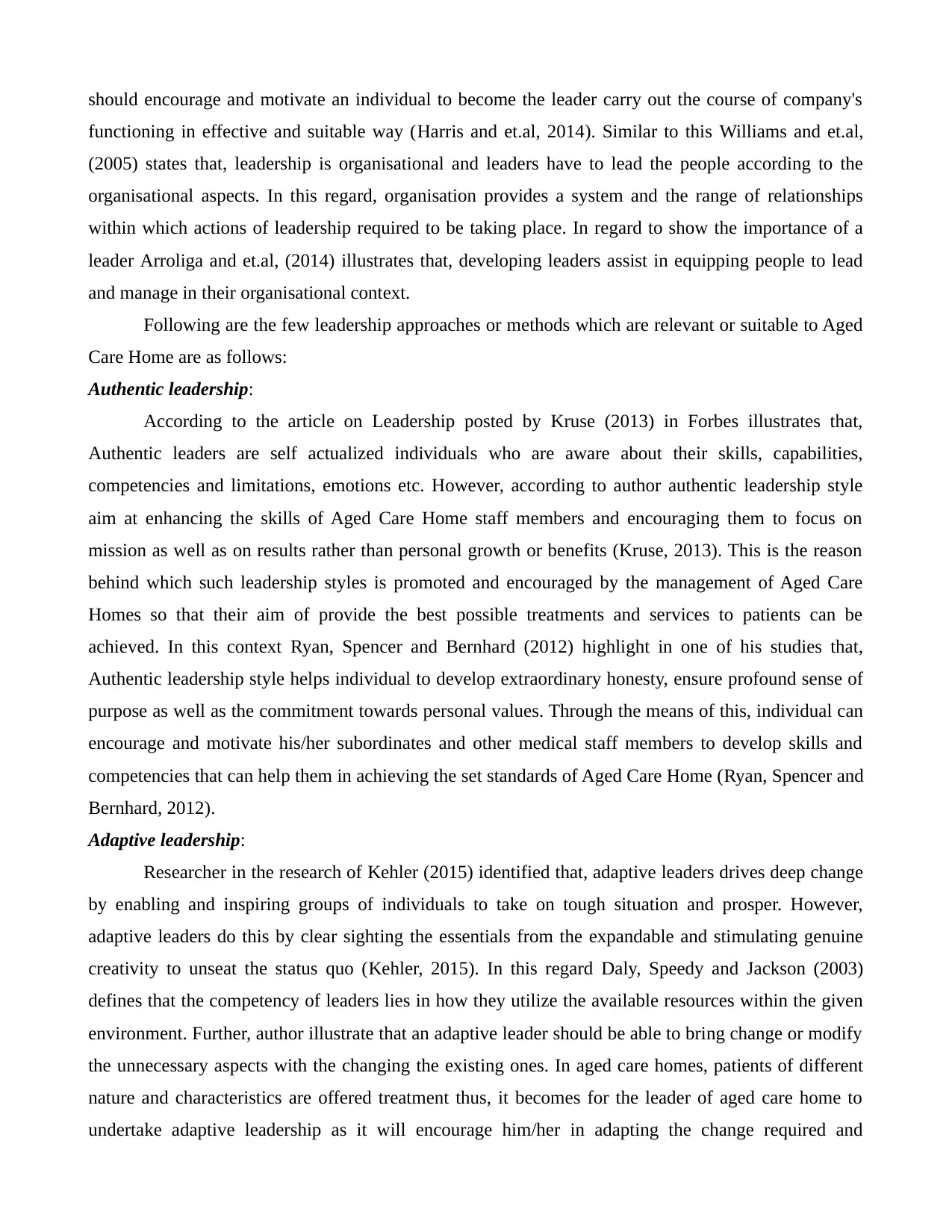
should encourage and motivate an individual to become the leader carry out the course of company's
functioning in effective and suitable way (Harris and et.al, 2014). Similar to this Williams and et.al,
(2005) states that, leadership is organisational and leaders have to lead the people according to the
organisational aspects. In this regard, organisation provides a system and the range of relationships
within which actions of leadership required to be taking place. In regard to show the importance of a
leader Arroliga and et.al, (2014) illustrates that, developing leaders assist in equipping people to lead
and manage in their organisational context.
Following are the few leadership approaches or methods which are relevant or suitable to Aged
Care Home are as follows:
Authentic leadership:
According to the article on Leadership posted by Kruse (2013) in Forbes illustrates that,
Authentic leaders are self actualized individuals who are aware about their skills, capabilities,
competencies and limitations, emotions etc. However, according to author authentic leadership style
aim at enhancing the skills of Aged Care Home staff members and encouraging them to focus on
mission as well as on results rather than personal growth or benefits (Kruse, 2013). This is the reason
behind which such leadership styles is promoted and encouraged by the management of Aged Care
Homes so that their aim of provide the best possible treatments and services to patients can be
achieved. In this context Ryan, Spencer and Bernhard (2012) highlight in one of his studies that,
Authentic leadership style helps individual to develop extraordinary honesty, ensure profound sense of
purpose as well as the commitment towards personal values. Through the means of this, individual can
encourage and motivate his/her subordinates and other medical staff members to develop skills and
competencies that can help them in achieving the set standards of Aged Care Home (Ryan, Spencer and
Bernhard, 2012).
Adaptive leadership:
Researcher in the research of Kehler (2015) identified that, adaptive leaders drives deep change
by enabling and inspiring groups of individuals to take on tough situation and prosper. However,
adaptive leaders do this by clear sighting the essentials from the expandable and stimulating genuine
creativity to unseat the status quo (Kehler, 2015). In this regard Daly, Speedy and Jackson (2003)
defines that the competency of leaders lies in how they utilize the available resources within the given
environment. Further, author illustrate that an adaptive leader should be able to bring change or modify
the unnecessary aspects with the changing the existing ones. In aged care homes, patients of different
nature and characteristics are offered treatment thus, it becomes for the leader of aged care home to
undertake adaptive leadership as it will encourage him/her in adapting the change required and
functioning in effective and suitable way (Harris and et.al, 2014). Similar to this Williams and et.al,
(2005) states that, leadership is organisational and leaders have to lead the people according to the
organisational aspects. In this regard, organisation provides a system and the range of relationships
within which actions of leadership required to be taking place. In regard to show the importance of a
leader Arroliga and et.al, (2014) illustrates that, developing leaders assist in equipping people to lead
and manage in their organisational context.
Following are the few leadership approaches or methods which are relevant or suitable to Aged
Care Home are as follows:
Authentic leadership:
According to the article on Leadership posted by Kruse (2013) in Forbes illustrates that,
Authentic leaders are self actualized individuals who are aware about their skills, capabilities,
competencies and limitations, emotions etc. However, according to author authentic leadership style
aim at enhancing the skills of Aged Care Home staff members and encouraging them to focus on
mission as well as on results rather than personal growth or benefits (Kruse, 2013). This is the reason
behind which such leadership styles is promoted and encouraged by the management of Aged Care
Homes so that their aim of provide the best possible treatments and services to patients can be
achieved. In this context Ryan, Spencer and Bernhard (2012) highlight in one of his studies that,
Authentic leadership style helps individual to develop extraordinary honesty, ensure profound sense of
purpose as well as the commitment towards personal values. Through the means of this, individual can
encourage and motivate his/her subordinates and other medical staff members to develop skills and
competencies that can help them in achieving the set standards of Aged Care Home (Ryan, Spencer and
Bernhard, 2012).
Adaptive leadership:
Researcher in the research of Kehler (2015) identified that, adaptive leaders drives deep change
by enabling and inspiring groups of individuals to take on tough situation and prosper. However,
adaptive leaders do this by clear sighting the essentials from the expandable and stimulating genuine
creativity to unseat the status quo (Kehler, 2015). In this regard Daly, Speedy and Jackson (2003)
defines that the competency of leaders lies in how they utilize the available resources within the given
environment. Further, author illustrate that an adaptive leader should be able to bring change or modify
the unnecessary aspects with the changing the existing ones. In aged care homes, patients of different
nature and characteristics are offered treatment thus, it becomes for the leader of aged care home to
undertake adaptive leadership as it will encourage him/her in adapting the change required and
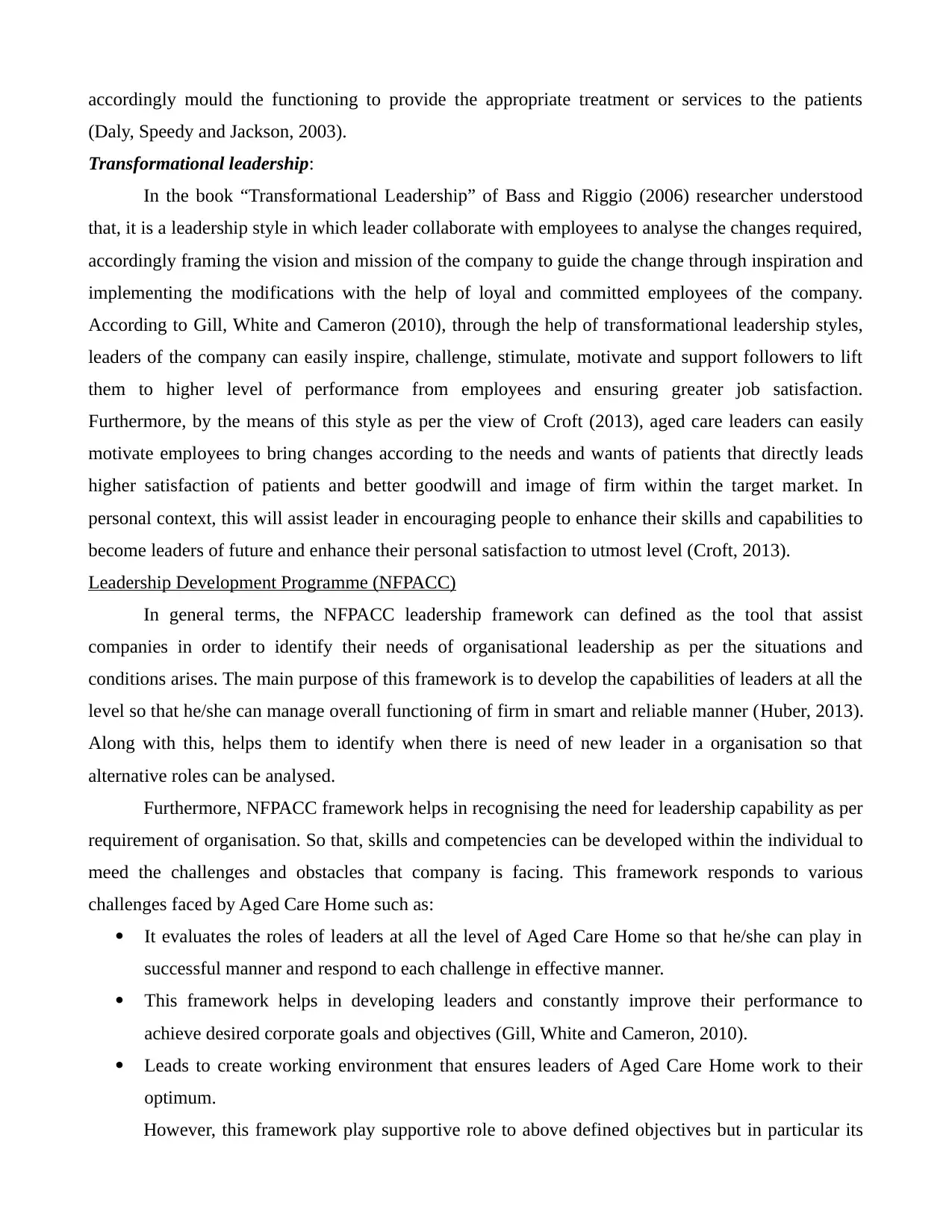
accordingly mould the functioning to provide the appropriate treatment or services to the patients
(Daly, Speedy and Jackson, 2003).
Transformational leadership:
In the book “Transformational Leadership” of Bass and Riggio (2006) researcher understood
that, it is a leadership style in which leader collaborate with employees to analyse the changes required,
accordingly framing the vision and mission of the company to guide the change through inspiration and
implementing the modifications with the help of loyal and committed employees of the company.
According to Gill, White and Cameron (2010), through the help of transformational leadership styles,
leaders of the company can easily inspire, challenge, stimulate, motivate and support followers to lift
them to higher level of performance from employees and ensuring greater job satisfaction.
Furthermore, by the means of this style as per the view of Croft (2013), aged care leaders can easily
motivate employees to bring changes according to the needs and wants of patients that directly leads
higher satisfaction of patients and better goodwill and image of firm within the target market. In
personal context, this will assist leader in encouraging people to enhance their skills and capabilities to
become leaders of future and enhance their personal satisfaction to utmost level (Croft, 2013).
Leadership Development Programme (NFPACC)
In general terms, the NFPACC leadership framework can defined as the tool that assist
companies in order to identify their needs of organisational leadership as per the situations and
conditions arises. The main purpose of this framework is to develop the capabilities of leaders at all the
level so that he/she can manage overall functioning of firm in smart and reliable manner (Huber, 2013).
Along with this, helps them to identify when there is need of new leader in a organisation so that
alternative roles can be analysed.
Furthermore, NFPACC framework helps in recognising the need for leadership capability as per
requirement of organisation. So that, skills and competencies can be developed within the individual to
meed the challenges and obstacles that company is facing. This framework responds to various
challenges faced by Aged Care Home such as:
It evaluates the roles of leaders at all the level of Aged Care Home so that he/she can play in
successful manner and respond to each challenge in effective manner.
This framework helps in developing leaders and constantly improve their performance to
achieve desired corporate goals and objectives (Gill, White and Cameron, 2010).
Leads to create working environment that ensures leaders of Aged Care Home work to their
optimum.
However, this framework play supportive role to above defined objectives but in particular its
(Daly, Speedy and Jackson, 2003).
Transformational leadership:
In the book “Transformational Leadership” of Bass and Riggio (2006) researcher understood
that, it is a leadership style in which leader collaborate with employees to analyse the changes required,
accordingly framing the vision and mission of the company to guide the change through inspiration and
implementing the modifications with the help of loyal and committed employees of the company.
According to Gill, White and Cameron (2010), through the help of transformational leadership styles,
leaders of the company can easily inspire, challenge, stimulate, motivate and support followers to lift
them to higher level of performance from employees and ensuring greater job satisfaction.
Furthermore, by the means of this style as per the view of Croft (2013), aged care leaders can easily
motivate employees to bring changes according to the needs and wants of patients that directly leads
higher satisfaction of patients and better goodwill and image of firm within the target market. In
personal context, this will assist leader in encouraging people to enhance their skills and capabilities to
become leaders of future and enhance their personal satisfaction to utmost level (Croft, 2013).
Leadership Development Programme (NFPACC)
In general terms, the NFPACC leadership framework can defined as the tool that assist
companies in order to identify their needs of organisational leadership as per the situations and
conditions arises. The main purpose of this framework is to develop the capabilities of leaders at all the
level so that he/she can manage overall functioning of firm in smart and reliable manner (Huber, 2013).
Along with this, helps them to identify when there is need of new leader in a organisation so that
alternative roles can be analysed.
Furthermore, NFPACC framework helps in recognising the need for leadership capability as per
requirement of organisation. So that, skills and competencies can be developed within the individual to
meed the challenges and obstacles that company is facing. This framework responds to various
challenges faced by Aged Care Home such as:
It evaluates the roles of leaders at all the level of Aged Care Home so that he/she can play in
successful manner and respond to each challenge in effective manner.
This framework helps in developing leaders and constantly improve their performance to
achieve desired corporate goals and objectives (Gill, White and Cameron, 2010).
Leads to create working environment that ensures leaders of Aged Care Home work to their
optimum.
However, this framework play supportive role to above defined objectives but in particular its
⊘ This is a preview!⊘
Do you want full access?
Subscribe today to unlock all pages.

Trusted by 1+ million students worldwide
1 out of 19
Related Documents
Your All-in-One AI-Powered Toolkit for Academic Success.
+13062052269
info@desklib.com
Available 24*7 on WhatsApp / Email
![[object Object]](/_next/static/media/star-bottom.7253800d.svg)
Unlock your academic potential
Copyright © 2020–2026 A2Z Services. All Rights Reserved. Developed and managed by ZUCOL.





